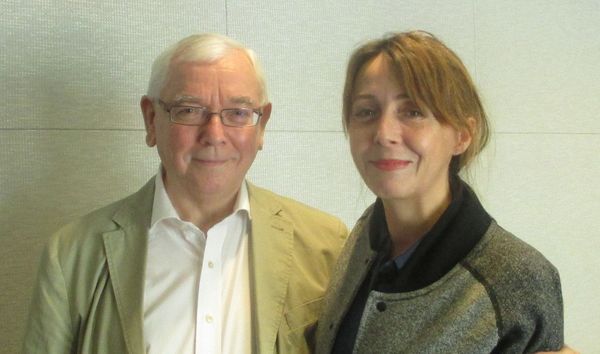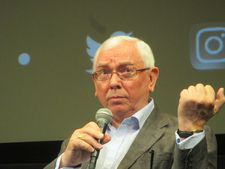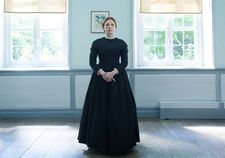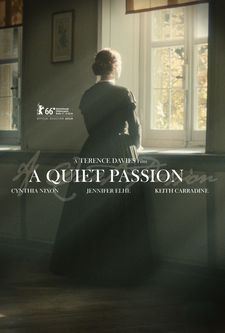 |
| Terence Davies with Anne-Katrin Titze at the W Hotel Union Square in New York Photo: Aimee Morris |
This is the first part of a series on my journey with Terence Davies into A Quiet Passion, starring Cynthia Nixon as Emily Dickinson with Jennifer Ehle (Alan Rickman's A Little Chaos) as her sister Vinnie, which was screened in the New York Film Festival in the Film Comment Presents selection. The exemplary supporting cast includes Keith Carradine (David Lowery's Ain't Them Bodies Saints), Duncan Duff, Joanna Bacon, Benjamin Wainwright (Jason Connery's Tommy's Honour), Emma Bell, Jodhi May (Sally Potter's Ginger & Rosa), Noémie Schellens, Catherine Bailey and Sara Vertongen.
 |
| Terence Davies with his A Quiet Passion star Cynthia Nixon Photo: Anne-Katrin Titze |
Terence Davies looks at questions of the soul, family, war, creativity and how to be true to yourself. We first encounter young Emily (Emma Bell) at Episcopalian boarding school where she realises that easy salvation isn't hers to even wish for. Her loving family, sans the perennially under-the-weather mother (Joanna Bacon) come to take her home to Amherst, Massachusetts to everybody's delight.
Time passes and Davies, in a trick so simple and playful and far-reaching, ages the portraits the family members have taken of themselves. Cynthia Nixon is a wonderful, knowing, doubting, twinkling Emily. Jennifer Ehle as Vinnie, is her perfect match in loving banter and bitter argument. Brother Austin (Duff), when he marries Susan Gilbert (May) gives them another sister. The female bonding comes across as effortless and their wit has lightning speed.
"Let's not be anything today except superficial," is a suggestion that doesn't go very far with Emily Dickinson, as much as she tries in A Quiet Passion.
 |
| Cynthia Nixon as Emily Dickinson: "I think it's true. She doesn't know why she can't feel as other people." |
When I met with Terence Davies near the Union Square Greenmarket on a lovely fall day, we briefly talked about the apple harvest before moving on to the poet of genius, his film is about.
Anne-Katrin Titze: "All the best compliments are dubious - that's part of their charm." I was trying to come up with a dubious compliment and I couldn't. I couldn't compete. But, do you agree with that? Do you think that's true?
Terence Davies (laughs): Partially, I suppose. It's sort of tongue-in-cheek, rather. But I do think it's partially true. Because it could also be very close to what we call in Britain, "damning with faint praise". And it's sometimes one or the other. The second one is always hurtful, because you'd rather say, look, if you don't like it, I'd rather you told me. But I suppose, the best compliments are … Actually, I hadn't really thought about it! I never thought about it. And I should have done. I'm sorry I can't answer properly.
 |
| Terence Davies: "I don't want you to act, I want you to feel it. Because then it's true." Photo: Anne-Katrin Titze |
AKT: Ever since I've seen your film, sentences like this have been haunting me. That's you and Emily Dickinson taking over together. Maybe that is a dubious compliment. But meant in the best sense. In the first scene the word wishing comes up a lot. "Do you wish to be with God?" The headmistress asks and then they separate. And Emily says, she wishes she could feel as others do.
TD: I think it's true. She doesn't know why she can't feel as other people. The reason is that she's a genius and she's got one skin less or not there. So she responds to the world very, very viscerally and without it being filtered through that extra protective skin which we all have. What is important, is to start at the beginning, that this is someone, even though she's only seventeen, she is thinking about the nature of God and the nature of the soul.
Although she cannot give the answers that Miss Lyon (Sara Vertongen) wants. She just can't because, as she says: I'm only 17. I haven't done anything to be sinful that I've got to be repentant about. You know, I've not done any harm. She hadn't. And although this is an Episcopalian school, it's very much like the idea in Catholicism of original sin.
 |
| Emily Dickinson with Vinnie (Jennifer Ehle): "I said - could you just smile or half smile?" |
Which is actually quite pernicious because there's nothing in the New Testament that tells you about original sin. There's no such thing! How can you say that a child who is born has got a sin on it? You can't because the child hasn't done anything. So it's about telling the truth as to how she feels. But that prefigures what is going to come later in the film - this struggle of the soul.
AKT: And along with that, not really understanding what the others want from her? There is the big struggle and also that she actually really doesn't grasp what others want.
TD: What she is saying and Miss Lyon doesn't understand it: I really do want to feel like other people. I don't want to feel like this but I got to be honest about it. I don't feel as they do. I can't! And at that age when you're too young to know, very often what you're struggling against, she's just trying to be honest. What Miss Lyon is demanding is obedience. And obedience is not the same as being honest.
 |
| Emma Bell as the younger Emily Dickinson: "She just can't because, as she says: I'm only seventeen." |
AKT: No, definitely not! Your decision to age the characters by having the portraits age, that's very Dorian Gray. And it's pointing us to conventions of cinema [switching from one actor to another]. Where did this idea come from?
TD: I have absolutely no idea. It has to be instinctive. I was sitting at home. It was one of those days where I was not writing anything and thinking, oh, I feel a bit stale. And then I thought, I wonder how I can age them? I wonder what I could do. I thought, I don't want prosthetic makeup and all that because that always looked so silly. And I looked at Miss Dickinson's photograph and what it says at the beginning of that sequence is right.
The photographer said, "Can you smile?" And he [Keith Carradine as her father Edward Dickinson] said, "I am smiling." Rereading that bit, I thought, yes, all we do is we just simply track in on them and they age, all four of them [Emily, her father and siblings] But I have no idea where it comes from.
 |
| Emily Dickinson's father Edward (Keith Carradine) with Emily |
AKT: It's brilliant. I loved it. Cinema hasn't done it like this before. I'd like to pick up with the smiles. The women have a very specific smile that they share, I felt. The two actresses playing Emily [Emma Bell and Nixon], the sister [Vinnie], and the brother's [Duncan Duff as Austin] wife [Jodhi May as Susan]. Did you give them any specific direction how to smile? It links them.
TD: No, I didn't. I mean, what I've always said to the actors in every film: I don't want you to act, I want you to feel it. Because then it's true. Once it's acted it becomes a collection of mannerisms. Oh, I'll do this as a bit of business, I'll do that because I look really good in profile! All that's just nonsense. And it's got nothing to do with truth - artistic truth that is. The only thing that you can't do … Well, what happens particularly and it's happening more and more in England now, people here, they don't smile, they grimace.
 |
| A Quiet Passion poster |
They show their teeth. But that's actually not a smile. In the animal kingdom to show your teeth is - I'll fight you if you come any closer! That's what it actually means. The half-smile is much more interesting. And probably in those days, they didn't have such good teeth anyway, so a lot of people would not have smiled, especially in their portraiture. Also, the length of time they had to sit before there was an exposure.
I didn't want them to grimace. But I didn't say that. I said - could you just smile or half smile? And then other times you just leave it. When Vinnie says to her [Emily]: "You know, I've had bad thoughts, too." And she does see the funny side of it and then she does bare her teeth. And she says to her "If that were your only wickedness." Because she's obviously wished Mabel Loomis Todd (Noémie Schellens) to go to hell. Vinnie's little attempt at thinking something horrible because she is not capable of being horrible. They are capable of arguing and they do. And I said, when you argue, you really argue. Sometimes you don't have to say anything.
Sometimes they just do it. We got most of those performances in less than four takes. They'd come and say, can we go straight away? And I'd say, yeah. You got to capture that. It's almost close to improvisation. They're not sure what they are doing but what they are doing is organic because they are feeling it. That you can't direct. You just think, oh I hope they are doing this in the next take. But I'm not going to tell them because they become self-conscious.
AKT: It's almost as if it's contagious. As if they have become family through that smile.
TD: That's lovely. Thank you. I hadn't thought of that.
Coming up - Terence Davies on costumes, a world without subtlety, death and Jean-Pierre Léaud as Louis XIV, hearing Claire Bloom read Emily Dickinson, kidney stones, his drama school audition, bad traits, his upcoming project on war poet Siegfried Sassoon and much more.
A Quiet Passion will screen at the BFI London Film Festival on October 10 at 6:00pm and October 12 at 11:30am.
The 54th New York Film Festival runs through October 16.
A Quiet Passion opens in cinemas in the UK on November 18 and in the US in 2017.





















